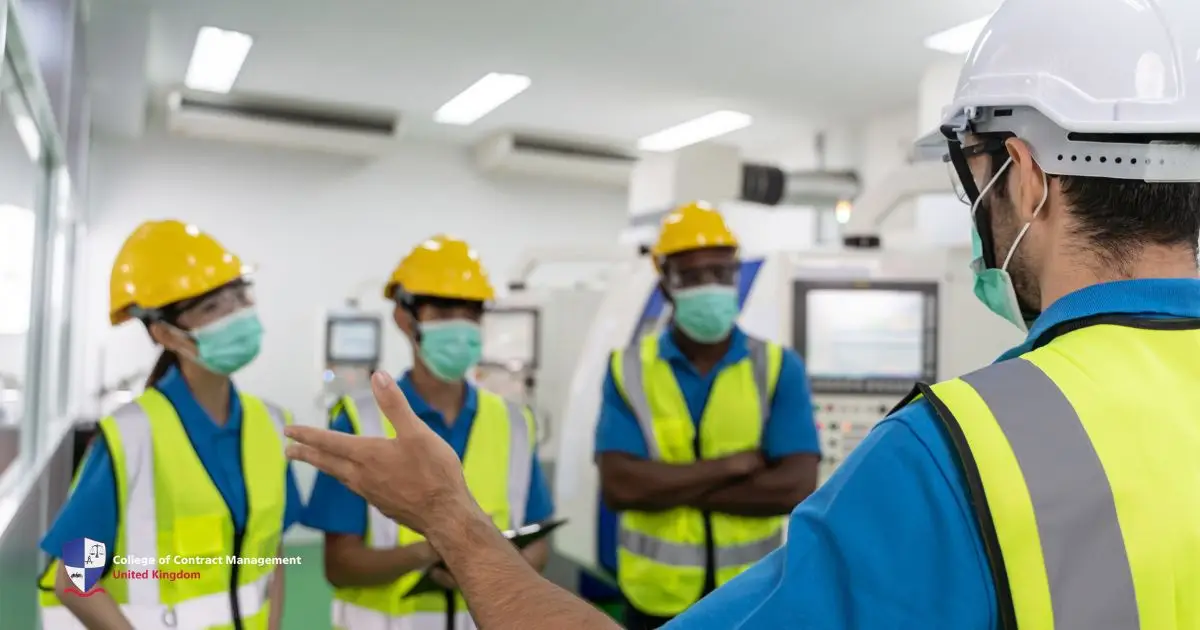If you're thinking about becoming a construction manager, you're choosing a rewarding career. This job is great for those who like overseeing big projects and collaborating with different teams. For this reason, with construction management, you'll have a big hand in shaping the places where we live and work. Additionally, seeing your ideas come to life on such a large scale is exciting.
So, here's a simple guide to help you get started, along with some helpful courses. Whether you're just beginning or looking to move up in your construction management career, this information will set you on the right path.
What does a Construction Manager do?
A construction manager handles planning, scheduling, and coordinating to keep everything on track and ensure high-quality work that meets safety standards. So, basically, it is a job that ensures that a building project runs smoothly from start to finish.
For this reason, this role requires knowing the ins and outs of construction and being a strong leader. To sum up, they solve problems on the spot, make adjustments as needed, and keep everyone focused on getting the job done right.
Responsibilities of a Construction Manager
As a manager in this profession, your responsibilities will include:
- Overseeing construction sites: Make sure daily tasks match the project plans.
- Coordinating with multiple teams: Work with architects, engineers, and contractors to ensure smooth collaboration.
- Ensuring project compliance: Make sure to follow health, safety, and environmental rules.
- Budget management: Keep an eye on spending and make sure projects stay within budget.
- Addressing on-site issues: Solve problems fast to keep the project moving smoothly.
Steps to becoming a Construction Manager in the UK
To become a construction manager, you'll need a combination of education, hands-on experience, and industry certifications. So, Here's a breakdown of each step to help you progress along this career path:
- Get the right education for the job.
- Build hands-on experience by working on construction sites.
- Focus on learning the key skills you'll need in the role.
- Earn certifications that are valued in the industry.
- Keep learning and connecting with other professionals.
As a result, it plays a big role in becoming a successful construction manager. So, from learning the basics to taking on bigger responsibilities, each phase builds up your skills and confidence. To sum it up, it's all about steady growth and gaining experience to tackle the challenges of the job.
Step 1: Obtain a relevant education
As a construction manager, you begin your career with some education in a related area. Additionally, this background gives you a good understanding of construction processes. As well as management techniques and safety guidelines. So, if you're in the UK and looking to get into this field, there are many courses you can take to help you get started.
- Bachelor's in Construction Management: This programme teaches you how to manage projects, oversee construction sites, and understand the rules and regulations of the building.
- The Higher National Diploma (HND) in Construction and the Built Environment: You'll study building techniques and project management while gaining hands-on skills through internships or work placements.
- NVQ in Construction Site Management: You'll learn to oversee workers, ensure site safety, and keep everything running smoothly. Additionally, it's an excellent way to boost your career in construction and prepare for leadership roles. As a result, it enhances your job prospects in the industry.
So overall, these programmes provide the technical knowledge and managerial skills essential for becoming a construction manager.
Step 2: Gain practical experience
Getting practical experience in the construction industry is really important for anyone wanting to become a construction manager. For this reason, many people begin their careers in entry-level jobs, like site assistants or project coordinators. These roles give them a good look at what happens day-to-day on construction sites. To sum it up, this hands-on experience helps you learn how to manage teams, stick to schedules, and deal with any challenges that come up on-site.
Ways to gain construction experience
You can gain practical experience in construction in several ways, like doing internships with construction companies. As a result, it allows you to work with seasoned professionals and get a feel for the industry.
- Entry-level roles on construction sites: Jobs like site assistant or junior project coordinator give you a good understanding of what a construction manager does.
- Volunteering on smaller: Helping with local building projects is a great way to learn new skills and meet people in your community.
Each option offers a different way to learn, helping you become a better construction manager in the future. For this reason, this kind of experience can help you advance your construction career.
Step 3: Develop essential skills
To be a great construction manager, you need a combination of hands-on skills and good people skills. So here are some important abilities that can help your job: success in the
- Leadership: Help and inspire different team members to reach project goals.
- Budgeting: Keep an eye on project costs, manage spending, and make sure everything stays on budget.
- Risk Management: Spot possible problems and come up with backup plans.
- Safety Awareness: Make sure to follow health and safety rules on the site to keep everyone safe.
- Effective Communication: Share information clearly with contractors, clients, and the team.
To sum it up, these skills are important for handling complicated projects and ensuring that every task fits the overall goals. As a result, when you have these skills, it becomes easier to keep everything on track. Additionally, you'll know that you are moving in the right direction.
Certification for construction manager
Certifications boost your credibility and show you are dedicated to meeting industry standards. So, here are some of the most respected certifications include:
- CIOB Membership: The Chartered Institute of Building offers membership that signifies professionalism and adherence to industry best practises.
- RICS Accreditation: Getting accredited by the Royal Institution of Chartered Surveyors is important in the construction industry because it shows that you have solid management skills.
- CSCS Card: The Construction Skills Certification Scheme (CSCS) ensures workers have the right skills for working on construction sites.
Getting these certifications shows that you care about doing a great job. It signals to potential employers that you're serious about your profession.
Step 4: Master Construction Management Software
Knowing how to use construction management software is becoming more important for a construction manager. So here are some of the most commonly used tools:
- Microsoft Project: Helps you keep your projects organised and on track, making sure they finish on time and don't go over budget.
- AutoCAD: It helps you examine construction plans more closely and communicate with architects more easily.
- Building Information Modelling (BIM): This helps you keep your projects organised and on track, making sure they finish on time and don't go over budget.
Getting the hang of these tools can make managing projects a lot easier and boost how well everything runs. Additionally, using them can help save time and keep everyone on the same page.
Recommended Software courses
So if you want to get better at using software, think about signing up for some courses. You can try online tutorials or find local classes. So, this way, you can learn at your own speed and understand what you're doing as a construction manager:
- BIM Essentials: BIM is all about getting a good grasp of design principles and learning how to handle data well.
- AutoCAD Essentials: Get started with creating, looking at, and simply tweaking architectural designs.
- Microsoft Project Management Certification: Get the essential know-how to manage project timelines, resources, and schedules effectively.
To sum it up, these courses can help you build your skills and Stand out in the construction management field.
Step 5: Continue Learning and Networking
It is important to stay up-to-date with the latest trends and technologies in construction management. Connecting with other professionals can open doors for mentorship, as well as teamwork, and career growth. To keep ahead in this ever-changing field, try to attend conferences, join industry groups, and consider taking some advanced courses.
Advanced learning options
A lot of construction manager go after advanced training to sharpen their skills. Here are some popular options:
- MSc in Construction Project Management: A master's degree in managing projects, understanding construction law, and handling risks.
- Diploma in Contract Management: This covers negotiating contracts, buying what you need, and delivering projects effectively.
- PRINCE2 Certification: This is a well-known project management system that's great for handling complex construction projects.
These programmes deepen your knowledge and prepare you for leadership positions within the industry.
Why choose a career as a Construction Manager
In this job, you get to oversee projects from the ground up, managing teams, schedules, and budgets along the way. It’s all about making building plans come to life. This work is really rewarding, and there’s a big demand for it in areas like homes, commercial buildings, and infrastructure. That means you can look forward to job stability and a solid paycheck.
As a construction manager, you'll get a mix of working on-site and doing planning. If you enjoy seeing the results of your efforts and thrive in a busy environment, this career could be a great fit for you. It's perfect for those who like leading teams and making things happen in a constantly changing field.
Career path and salary
A Construction manager can move to positions like project director, site operations manager, or quality control manager. So, in high-demand areas, salaries can be even better. So, here's a quick look at salary ranges, which can change based on experience, location, and industry:
- Entry-Level: £25,000 - £35,000 per year
- Mid-Level: £35,000 - £60,000 per year
- Senior-Level: £60,000 - £90,000+ per year
Our role in your career
So, if you're interested in a career as a construction manager, there are some great courses for you. These classes focus on practical skills and knowledge you can use in the real world, as well as handling contracts. College of Cont topics like how to manage projects and follow safety rules, all of which can help you succeed in the construction industry.
The College of Contract Management offers flexible online courses perfect for beginners and experienced managers. So, if you want to boost your career in this exciting field, the College of Contract Management can help you get started.





